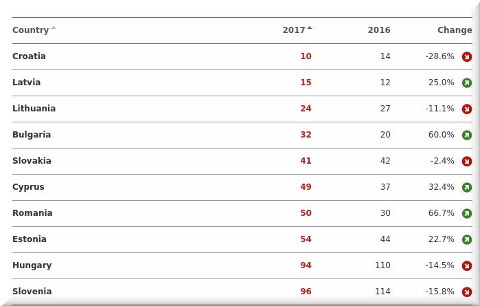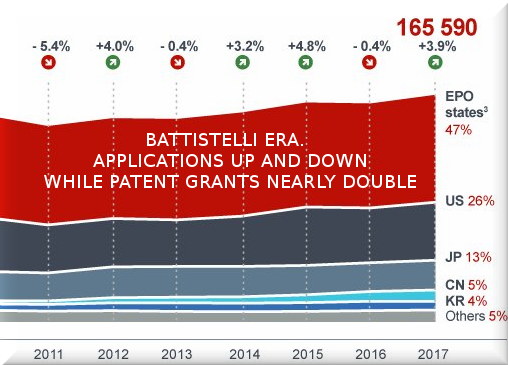

Not much 'growth' in Europe (as in European Patent Office)

China is ranked 38th for patent applications per capita (at the EPO) and accounts only for 5% of applications
IF the EPO was a goose that lays golden eggs, those eggs would be the backlog. Pending applications don't last forever and Battistelli now slaughters the goose, making redundancies quite imminent; Office rumour is, the Office will lay off about quarter of staff (the numbers/estimates heard vary).
"...Office rumour is, the Office will lay off about quarter of staff (the numbers/estimates heard vary)."We don't wish to depress staff, but realistic expectations prevent disappointment. Earlier this month (and even this week in Twitter) the EPO was spreading false or misleading information which it called results. We responded in the following 4 posts (and limited that to 4 although we could go on and on):
"China, with a relatively small contribution to EPO totals, is still being emphasised everywhere. It's not hard to see why; the biggest 'growth' comes from there (relative growth, not absolute)."Yesterday the EPO wrote: "Applications from France up again (+0.5%) in 2017 after a drop in the previous year..."
Pretty pathetic considering the fact that Battistelli gave them a discount. Had he not done that, it would be negative again. Notice how they send a shoutout there to INPI, where a lot of Team Battistelli came from.
What are we seeing at the EPO that actually gives room for hope? Almost nothing. Appeals are being made more expensive in order to discourage repeals/rejections of patents. Especially when it comes to oppositions, not rejections being appealed. Figures pertaining to rejections don't take fee alterations into account (so year-to-year comparisons are inadequate). The same goes for the number of applications (the prices were lowered to artificially increase 'growth', just not in terms of revenue).
"Appeals are being made more expensive in order to discourage repeals/rejections of patents."Don't expect any law firms to speak about it. They profit from this turbulence and the increase in so-called 'production' typically means more business for them. They also longed for the UPC, knowing that a growing number of lawsuits would help their bottom line (at the expense or everyone else).
Laura Carney and Thomas Zvesper from Marks & Clerk now speak about the Boards, but they will never ever mention the EPO scandals as that might 'upset' their monetary supply chain. Yesterday they wrote this self-promotional piece (infomercial as we called it yesterday) about an old case:
In the present decision, the Board had to consider the validity of the priority claim of patent EP1773302. In particular, the Board had to consider whether the granted patent’s priority claim was invalid in view of an earlier document which was the “first application” from which priority should have been claimed. The patent and the application from which priority was claimed were directed to a tablet having, amongst other features, a gelatinous first and second coating, a gap being provided between the two gelatinous coatings of from 3 to 33% of the length of the tablet. However, the patentee had filed an earlier application (US 2005/0152970, D22) which was identical to the granted patent, except that the disclosed gap was 5 to 33%.
"Perhaps Europe could take a lesson from south Asia."Like we said some weeks ago as well as last month, with an upcoming appeal regarding CRISPR patents we worry that the Boards won't be able to rule impartially. They themselves complain about it on occasions. Yesterday, as usual, patent maximalists from Managing IP were celebrating CRISPR patents, neglecting to note that these are bunk and usually void in the US (and more recently in Europe as well). "Filing trends include a 194% increase globally between 2013 and 2015," it said, but filings and grants aren't the same, never mind actual court rulings (of which they are few that can assess/determine patent eligibility in light of Myriad, Mayo, the EPC and so on).
Perhaps Europe could take a lesson from south Asia. India, for example, successfully resisted the patent maximalists and antagonised many software and pharmaceutical patents. It usually explains (correctly in our view) that when it comes to patents the interest of the people (not very rich people and corporations) should come first.
"As many people expected (Glyn Moody for instance), China now uses US courts to hit American companies over the head, essentially taking the patent aggression abroad, too. Makes one wonder what Chinese firms can do with all these European Patents, with or without a horrific system like UPC in place."IAM just won't leave India alone. Jacob Schindler wrote many articles last year in which he shamed India. Coming from the patent trolls' lobby (IAM), this is more or less expected, albeit it seems like they softened their tone after that. Instead of bashing India like it was some kind of 'pirate', IAM now calls India's policy something "controversial among multinational patent owners." They kept bullying India, yet the language changed somewhat. Yesterday IAM said: "Litigation developments in Delhi over the last few months have put a spotlight on a somewhat unique feature of India’s patent system: Form 27, which requires patentees to disclose how they commercially exploit their granted rights. Now, it appears that the Patent Office will consider making changes to the form, which has long been controversial among multinational patent owners. Each year, patentees must submit a disclosure to the Indian Patent Office stating whether each patent they own is being “worked” on a commercial scale in India."
So they realise that a massive pile of fictional patents on fictional things isn't dedirable. Unlike China?
China officially opened the floodgates to software patents about a year ago (April) and since then we have seen a lot of patent aggression in China. It's chaotic. "Meanwhile," IAM noted yesterday, "Chinese tech giant ZTE disposed of seven US assets [patents] in a deal which was executed on 22nd January and recorded on 15th March."
These are going to patent trolls, which IAM euphemises as "NPE", as usual. Here's what remains outside the new paywall:
ZTE and Panasonic have both transferred small packages of patents to a relatively new US NPE called Global Innovation Aggregators, a Delaware registered entity with offices in Pasadena, California. According to the assignment records Panasonic handed over 11 US grants in two separate deals that were recorded on the USPTO’s site earlier this month and executed in late February. Meanwhile Chinese tech giant ZTE disposed of seven US assets in a deal which was executed on 22nd January and recorded on 15th March. For Panasonic it is the latest in a long line of patent divestments which most recently included the transfer...